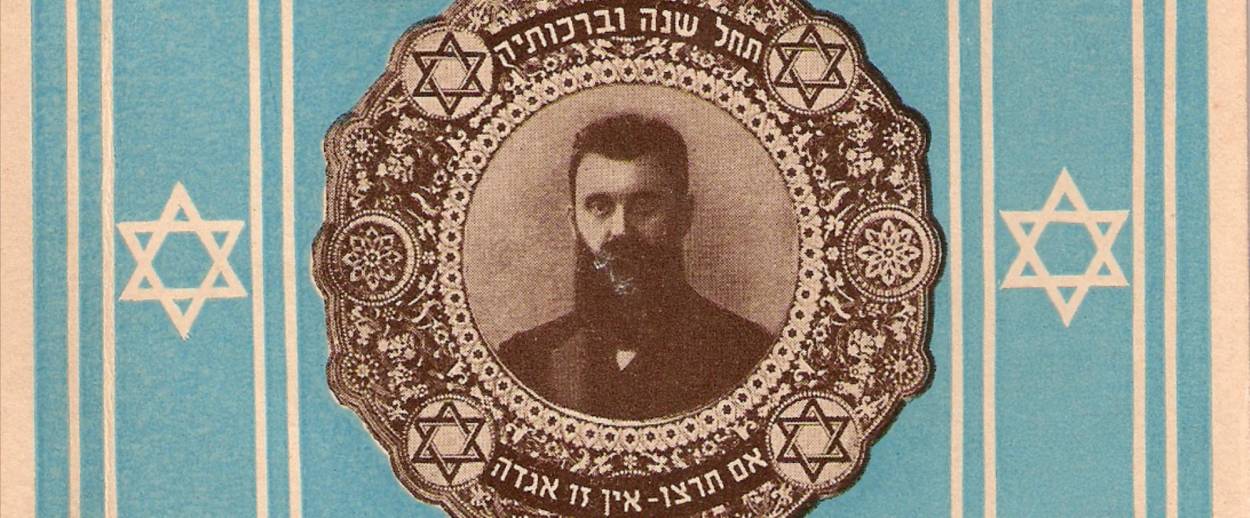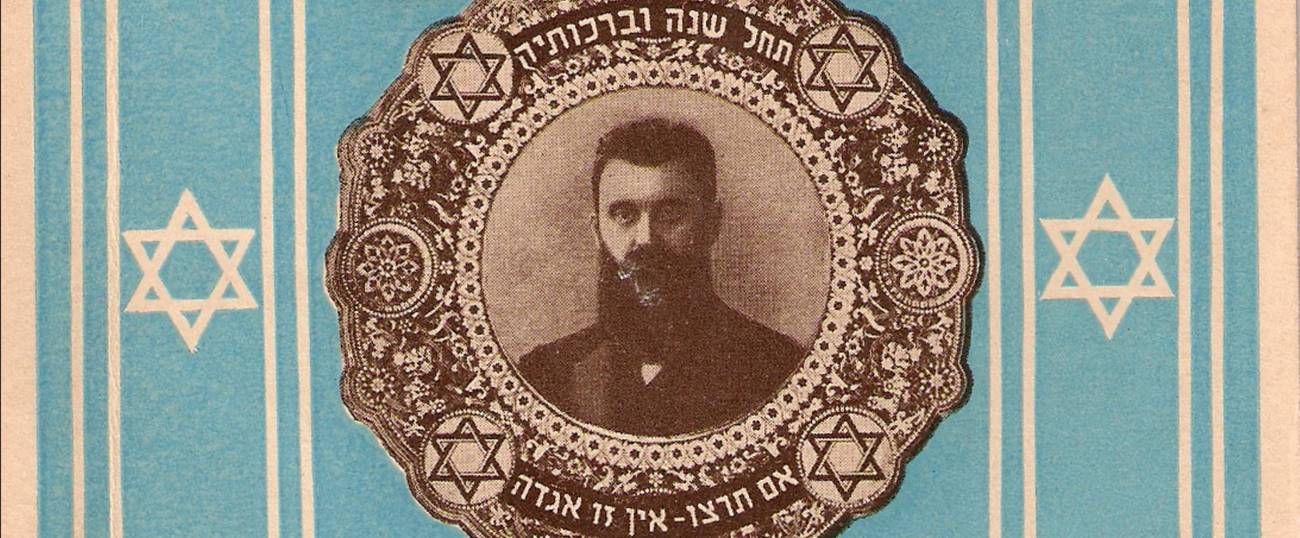Celebrate Yom Ha’atzmaut by Watching This Rock Opera About Theodor Herzl
Long before ‘Hamilton’ there was ‘King of the Jews,’ an Israeli production in which the Zionist visionary sings, dances, and even raps




Could there be a more entertaining way to celebrate Israel’s 69th Independence Day—which by happy coincidence falls this year on Theodor Herzl’s 157th birthday—than by watching a recording of a 1992 Israeli musical that tells Herzl’s life story? Perhaps, but bear with me here.
Long before Hamilton became a hit in New York, Theodor Herzl came to Tel Aviv, singing, dancing, and even rapping. Twenty-five years ago, months after Yitzhak Rabin returned to the Prime Minister’s office, Habima, Israel’s national theater, mounted a production of King of the Jews, an original rock opera about the Herzl. It was a minor hit but, save for a brief revival, has long since been forgotten.
Though Herzl began his career as a playwright, his own plays have rarely been performed in the state he envisioned. Considering his weighty presence in Zionist history (not to mention his dramatic, bearded visage), his absence from Israeli stages as a protagonist is also surprising. (Herzl, an avant-garde production directed by Rina Yerushalmi in 2010, was a rare exception). To the rescue came Dvora Omer, the beloved children’s book writer, who wrote the book of King of the Jews, and Rami Kleinstein, the self-styled Israeli Billy Joel, who wrote the music. The tongue-in-cheek lyrics, however improbably, were provided by none other than Yair Lapid, then a rising journalist in his late twenties. Today, Lapid is a former Finance Minister, and according to many polls, a leading candidate to succeed Prime Minister Netanyahu.
Despite the pedigree of the talent assembled by Habima, the results of the production are a mixed bag, but it is delightful in its own way. (Doubtless, the poor quality of the digitized VHS recording does not do justice to the production directed by Uri Paster). Like the European rock musicals by Andrew Lloyd Webber and his ilk which inspired it, King of the Jews often can’t make up its mind whether or not it’s meant primarily for children. The (quickly-abandoned) framing device suggests it is: Two schoolkids, bored out of their minds working on a research project at the Zionist Archives, stumble upon a stash of Herzl’s private writings. Suddenly, to the sound of violins, Herzl himself appears. Riffing on his famous quote, “If you will it, it is no dream,” he sings: “If you dream too much / There is no truth left / If you don’t dream / Man, you’re dead!” We are in late 19th-century Vienna.
Soon, Dori (as Herzl is affectionately referred to) bumps into a man peddling pamphlets which call for the boycott of Herzl’s plays. “He’s Jewish,” explains the rabble-rouser, unaware that he is addressing the playwright himself. “They’re taking over everything, they should get out of here and go to their own land.”
“They don’t have one,” Herzl protests.
“So they should find one,” the man replies.
Herzl covers the Dreyfus affair for a Viennese paper, witnesses the mockery of justice and hears the cries of “death to the traitors” and “death to the Jews.” Haunted, he sings: “Where today there are sand dunes / tomorrow there will be homes.” Soon we are in Basel, at the First Zionist Congress, where Herzl’s acolytes rap: “Ladies and gentlemen / dear Zionists / dressed in tails and top hats / you’ve arrived in Basel, welcome! / Here we’re establishing a state for the Jews! / Hurry, hurry, soon there won’t be room / Everyone wants a slice of the dream!”
Herzl is portrayed by Yigal Sadeh, one of Israel’s finest stage actors (currently a superb Javert in Habima’s Les Miserables); his Herzl is equal parts savvy politician and manic-depressive prophet. Idit Teperson delivered sensitive portraits of Herzl’s long-suffering wife Julie and mother, Jeanette. The rest of the characters are more roughly sketched, particularly the leaders Herzl tirelessly lobbies in support of the Zionist idea, be they the German Emperor Wilhelm II, the Ottomon Sultan (“It says ‘Abdul’ on his ID card / but the guys call him Sultan”), or Pope Pius X, who promises Herzl a state – the moment all Jews accept Christ as their savior.
Giving Herzl’s life story a satisfying finale requires us to gloss over his familial tragedies: His daughter Paulina died of a heroin overdose, his son Hans killed himself, and his daughter Margarethe died at Theresienstadt. Herzl himself died at 44, not before committing the cardinal sin, in modern Israeli eyes, of shifting his support to the Uganda Proposal. And, of course, Herzl’s visions of doom proved all too real; six million were to die before the United Nations voted in favor of Israel’s establishment. King of the Jews may not grapple with these tragedies head on, but it strikes a somber note. Forty-four years after Herzl’s death, Israel was born, one of the kids points out. Forty-four years later, his life became a musical. “If you dream too much / you die,” the cast sings, as the curtain falls.
Part 1:
Part 2:
Tal Kra-Oz is a writer based in Tel Aviv.